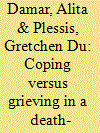| Srl | Item |
| 1 |
ID:
098342


|
|
|
|
|
| Publication |
2010.
|
| Summary/Abstract |
The aim of this study was to understand how AIDS-bereaved women in Indonesia cope in a society where death is believed to be fated. Data analyses were conducted based on the women's interview transcripts and journal entries. Each of the women experienced at least three traumatic life events. The most challenging experience was learning that they have contracted a disease they regarded as associated with prostitution. Given the short lapse of time between their husbands' deaths and learning about their seropositivity, biographical disruption appeared to have acted as an 'analgesic', while concerns to protect their children seemed to have triggered biographical reinforcement. This phenomenon may have brought about a positive bereavement outcome. Specific counselling programmes for women affected by HIV/AIDS are needed, but emphasis should first be placed on improving their wellbeing and their perception of stigma.
|
|
|
|
|
|
|
|
|
|
|
|
|
|
|
|
| 2 |
ID:
144552


|
|
|
|
|
| Summary/Abstract |
Late eighteenth-century colonial agrarian and judicial reforms had a direct impact on women from elite and non-elite backgrounds. Informed by British liberal ideologies and upper-caste Brahmanical norms, colonial policies marginalized women's access to, and control over, resources in the emergent political economy. In this article, I reconstruct histories of the ways in which Anglo-Hindu law compromised women's status as heirs, businesswomen, and members of society who wielded social capital with other community groups. Focusing on widows in Banaras who commandeered their property disputes, I illustrate that pre-colonial precedents of case-resolution under the Banaras rulers, and practices of ‘forum shopping’ by disputants themselves, shaped the widows’ approach to the colonial courts. Colonial judicial plans being incommensurable to everyday life, the courts incorporated pre-colonial forms of dispute handling and maintained a flexible approach to the practice of colonial law under the supervision of an Indian magistrate for a period of time. These characteristics made the courts popular among local society in the Banaras region. However, British officials, insistent on applying abstract scriptural laws, aligned customary practice to the dictates of Anglo-Hindu law. This article shows that the narrow legal subject position available to widows under scriptural law reordered their relationships with family and community networks to their disadvantage.
|
|
|
|
|
|
|
|
|
|
|
|
|
|
|
|